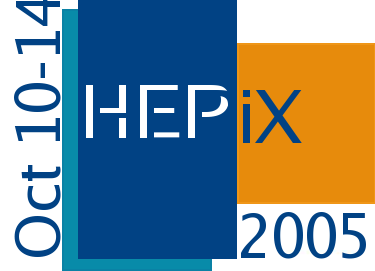 HEPiX Fall 2005 at SLAC
HEPiX Fall 2005 at SLAC
| Monday, 10 October 2005 (Collaboration Tools SIG) | |
|---|---|
| 08:00-09:00 | Registration |
| 09:00-09:15 | Chuck Boeheim/Alan Silverman Welcome to the Collaboration Tools SIG
|
| 09:15-09:40 | Christopher Huhn (GSI) Wiki at GSI: Towards a collaborative application platform
|
| 09:40-10:05 | Achim Grindler (Karlsruhe) WIKI based Change and Configuration Management Portal Solution
|
| 10:00-10:30 | Wolfgang Friebel (DESY) FormFactory - Template based web forms
|
| 10:30-11:00 | Coffee |
| 11:00-11:30 | Thomas Baron (CERN) Indico: An Event Management Software
|
| 11:30-12:00 | Alf Wachsmann (SLAC) Voice over IP with Skype
|
| 12:00-12:30 | John Gordon (CCLRC-RAL) Access Grid - Support in the UK
|
| 12:30-13:30 | Lunch |
| 13:30-14:00 | Alexandre Lossent (CERN) Collaborative tools in NICE
|
| 14:00-14:30 | Philipe Galvez (Caltech) VRVS to EVO
|
| 14:30-15:00 | Steven M Goldfarb (Univ of Michegan/CERN) The LCG RTAG on Collaborative Tools Part 2
|
| 15:00-15:30 | Coffee |
| 15:30-16:00 | Brooks Collins (SLAC) Remote Collaboration Working Group |
| 16:00-16:30 | Christian Helft (IN2P3) Collaboration at IN2P3 and Future Deployments of Video Conferencing in HEP
|
| 16:30-17:00 | Alexandre Lossent (CERN) Web hosting Services at CERN
|
| Tuesday, 11 October 2005 (HEPiX) | |
|---|---|
| 08:00-09:00 | Registration |
| 09:00-09:25 | Jonathan Dorfan (SLAC Director) Welcome |
| 09:25-09:45 | Multiple Start of the HEPiX meeting. Introduction, status, goals... |
| 09:45-10:00 | Chuck Boeheim SLAC Site Report |
| 10:00-10:15 | Martin Bly RAL Site Report |
| 10:15-10:30 | Helge Meinhard CERN Site Report |
| 10:30-11:00 | Coffee |
| 11:00-11:15 | Alexander Withers BNL/RHIC Site Report |
| 11:15-11:30 | Roberto Gomezel INFN Site Report |
| 11:30-11:45 | Peter Gronbech Oxford Site Report |
| 11:45-12:00 | Corrie Kost TRIUMF Site Report |
| 12:00-12:15 | Jonathan Schaeffer IN2P3 Site Report |
| 12:15-12:30 | Walter Schoen GSI Site Report |
| tba | Cary Whitney NERSC Site Report |
| 12:30-13:30 | Lunch |
| 13:30-14:00 | Robert Petkus (BNL) OpenLDAP Configuration and Tuning in the Enterprise
|
| 14:00-14:30 | Hege Hansbakk (CERN) Managing software licenses in a large organization |
| 14:30-14:50 | Ruben Gaspar Aparicio (CERN) Progress report in CERN Certification authority deployment and Single Sign On with Certificates
|
| 14:50-15:00 | John Gordon (RAL) RAL Progress in Single Sign On
|
| 15:00-15:30 | Coffee |
| 15:30-16:00 | Richard Mount (SLAC) Scientific Computing at SLAC
|
| 16:00-16:30 | Bob Cowles (SLAC) Security Update Rainbow Crack Video
|
| 16:30-17:00 | Marc Mengel (FNAL) Fermilab Plone Update
|
| Conference Dinner at Computer History Museum - Starting at 7:00pm | |
| Wednesday, 12 October 2005 (HEPiX) | |
|---|---|
| 09:00-09:15 | Manfred Alef GridKA Site Report |
| 09:15-09:25 | Pierrick Micout DAPNIA Site Report |
| 09:25-09:35 | Michele Jouvin LAL Site Report |
| 09:35-09:45 | Sabah Salih Manchester Site Report |
| 09:45-10:00 | Kelvin Edwards JLAB Site Report |
| 10:00-10:15 | Fraser R. Speirs ScotGrid Site Report |
| 10:15-10:30 | Stephan Wiesand DESY Site Report |
| 10:30-11:00 | Coffee |
| 11:00-11:30 | Reinhard Baltrusch (DESY) Experiences with WSUS/SUS as Patch Deployment Solution for Windows at DESY
|
| 11:30-12:00 | Sean Roberts, Jean Pierre (SLAC) Microsoft Clustering |
| 12:00-12:30 | Ruben Gaspar Aparicio (CERN) Nice Admin towards running windows with no admin privileges
|
| 12:30-13:30 | Lunch |
| 13:30-14:00 | Tom Abel (SLAC/Kavli Institute for Particle Astrophysics) Computational Cosmology
|
| 14:00-14:30 | Alexander Withers (BNL) Flocking at BNL: Implementing a General Use Queue
|
| 14:30-14:45 | Tim Bell (CERN) Activities following batch workshop in Spring HEPiX
|
| 14:45-15:00 | Francesco P. Prelz EGEE Batch System work
|
| 15:00-15:30 | Coffee |
| 15:30-16:00 | Troy Dawson (FNAL) Update on Scientific Linux |
| 16:00-16:30 | Andras Horvath (CERN) Linux status at CERN
|
| 16:30-17:00 | Marc Mengel (FNAL) Become Linux Distro Agnostic with Linux Standards Base
|
| 17:00-17:30 | Scientific Linux BOF
|
| Thursday, 13 October 2005 (HEPiX) | |
|---|---|
| 9:00-9:15 | Roger Jones (CERN) Storage Task Force Report
|
| 9:15-9:30 | Gilbert Grosdidier (LAL-Orsay and CERN/LCG-GD) The Light-Weight Disk Pool Manager
|
| 09:30-10:00 | Robert Petkus (BNL) Panasas at the RCF
|
| 10:00-10:30 | Andrew Hanushevsky (SLAC)/Jean-Yves Nief (IN2P3) Xrootd - Present and Future Xrootd at IN2P3
|
| 10:30-11:00 | Coffee |
| 11:00-11:30 | Jean-Yves Nief (IN2P3) BaBar data distribution using the Storage Resource Broker SRB at CC-IN2P3
|
| 11:30-12:00 | Radovan Chytracek (CERN) Databases for physics, their deployment and monitoring |
| 12:00-12:30 | Zhenping Liu (BNL) USATLAS dCache system at BNL
|
| 12:30-13:30 | Lunch |
| 13:30-14:00 | Matteo Melani (SLAC) Yet another Grid Project: the Open Science Grid (OSG) at SLAC
|
| 14:00-14:30 | Miroslav Siket(CERN) Update on Lemon
|
| 14:30-15:00 | David Kelsey (RAL) Planning for LCG emergencies
|
| 15:00-15:30 | Coffee |
| 15:30-16:00 | Keith Chadwick (FNAL) FermiGrid - Status and Plans
|
| 16:00-16:30 | Fraser R. Speirs (ScotGrid/University of Glasgow) Evolving Local Resources Towards the Grid
|
| 16:30-16:45 | Michel Jouvin (IN2P3/LAL) GRIF Project
|
| Friday, 14 October 2005 (Infrastructure/Machine Room Issues SIG) | |
|---|---|
| 09:00-9:30 | Hugo Cacote (CERN) Testing High Performance Tape Drives at CERN
|
| 09:30-10:00 | Helge Meinhard (CERN) Computer Hardware and Procurement at CERN
|
| 10:00-10:30 | Manfred Alef (Karlsruhe) CPU Benchmarking at GridKa
|
| 10:30-11:00 | Coffee |
| 11:00-11:30 | John Gordon (RAL) Accounting at RAL
|
| 11:30-12:00 | Chuck Boeheim (SLAC) An Incident with a 200ft Tree
|
| 12:00-12:30 | Tony Cass (CERN) The CERN Computer Centres
|
| 12:30 | Adjourn |